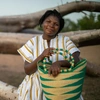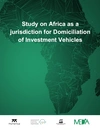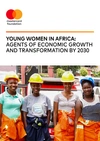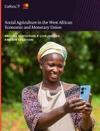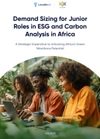The Mastercard Foundation works with visionary organizations to empower young people in Africa and Indigenous youth in Canada to access meaningful, dignified, and fulfilling work.
We seek to enable 30 million young people across Africa to access dignified and fulfilling work by 2030, with a focus on young women, refugees and displaced persons, and people with disabilities.
In Canada, our goal is for education and employment systems to be transformed to enable 100,000 Indigenous young people to access post-secondary education and transition to meaningful livelihoods by 2030, driving lasting impact in their communities and across Canada.

Tracking towards our commitment
Learn more about the Foundation-
-
M
Youth-in-Work since 2017
-
-
%
of our partners are African-led organizations
-
-
K
Indigenous youth in Canada engaged through EleV

Programs
Through our partners, we support more than 1,100 programs across Africa and in Canada.
Explore our programs
Countries
The Foundation has offices in Kigali, Accra, Nairobi, Kampala, Lagos, Dakar, Addis Ababa, and Toronto. Our work spans almost 40 countries in Africa and coast-to-coast in Canada.
Where we work
Focus Areas
We focus on leading sectors for youth employment, including education, agriculture, and the digital economy.
Learn moreResearch & Learning
Our research amplifies the voices of young people by highlighting their lived experiences and perspectives, particularly those of young women, young people with disabilities, and refugees and displaced persons.
-
Study on Africa as a Jurisdiction for Domiciliation of Investment Vehicles - Full Report
WAEMU, Kenya, Rwanda, Burkina Faso, Guinea-Bissau, Djibouti, Mozambique, Egypt, Benin, Ghana, Senegal, Zambia, Uganda, Côte d’Ivoire, Sierra Leone, Eritrea, Gambia, Eswatini , Democratic Republic of Congo, Tanzania, Nigeria, Zimbabwe, South Sudan, South Africa, Cameroon, Ethiopia, Niger, Morocco, Malawi, Chad, Syria, Mali, Togo, Somalia -
Young Women in Africa: Agents of Economic Growth and Transformation By 2030
WAEMU, Kenya, Nigeria, Rwanda, Uganda, Ethiopia, Ghana, Senegal -
Social Agriculture in the West African Economic and Monetary Union
Agriculture Côte d’Ivoire, Benin -
Sizing Demand for Junior Roles in ESG and Carbon Analysis in Africa
Kenya, Morocco, Rwanda, Uganda, Ethiopia, Ghana, Mozambique, Mali, Democratic Republic of Congo, Malawi, Gambia, Burkina Faso, Eritrea, Egypt, Djibouti, Côte d’Ivoire, Zambia, Syria, Chad, Eswatini , Zimbabwe, Tanzania, South Sudan, Somalia, Sierra Leone, South Africa, Guinea-Bissau, Senegal, Niger, Cameroon, WAEMU, Nigeria, Benin, Togo
Empowering young voices

Baobab Summit 2025
The Baobab Summit brings together the Mastercard Foundation Program Scholars, Alumni, partners, and other Foundation stakeholders to celebrate the Mastercard Foundation Scholars Program community. This year, our hybrid celebration takes place in Kenya and online, ensuring everyone can join in.
Learn more
Recognizing Leadership in Education for Indigenous Youth
The Mastercard Foundation announced $235 million in funding to 30 post-secondary institutions and organizations in recognition of their achievements and impact in education for Indigenous youth across Canada.
Learn more
Growing Futures: Education For Africa's Agricultural Revolution
Watch the powerful documentary on TAGDev Alumni: bold African changemakers redefining agriculture through innovation, resilience and community-driven leadership.
Learn more
Transcending Boundaries Podcast
A new podcast hosted by Reeta Roy will take you on an enlightening journey into the heart of values-based leadership.
Listen now
Learn More About Our Programs
Our programming approach is rooted in co-creation and understanding young people's aspirations, needs, and realities. We focus our efforts on areas where they can have the most equitable and sustainable impact at scale.
View all programsLatest from the Mastercard Foundation
-
Mastercard Foundation Appoints Alan Jope and Roberta L. Jamieson to its Board of Directors
-
Study Release Kicks off Country-By-Country Engagement to Boost Africa's Untapped Potential as Investment Vehicle Domiciliation Hub
-
Mastercard Foundation Board of Directors Announces Seasoned Technology Leader, Sewit Ahderom, as Next President and CEO
-
African School of Governance’s Pioneer MPA Class Celebrates Matriculation with a Student Dialogue with President Paul Kagame and Former Prime Minister Hailemariam Desalegn
-
Young West African Farmers Turn Social Media Into Tools for Growth
-
Mastercard Foundation Announces $235 Million to Post-secondary Educational Institutions in Canada to Recognize Strides Toward Reconciliation
-
From Crisis to Community: Sudan's Young People are Leading with Local Solutions
-
Upskilling Educators to Enhance EdTech Delivery
-
Diversify Learning Pathways for Out-of-School Youth
-
Lowering Access to EdTech through Strategic Private-Public Partnerships
-
Young Women Entrepreneurs in Kenya Call for Action to Unlock Finance for Their Businesses
-
A Letter From Adja: Young People Are the Heart of Africa’s Food Revolution










